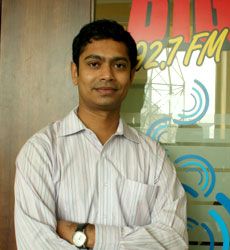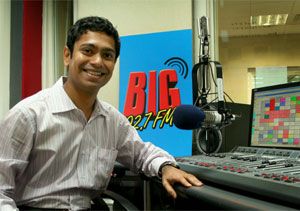

After the encouraging response to its Sing with Sonu initiative, Big FM is venturing into original music to differentiate itself from other radio stations. In a chat with Radioandmusic.com's Anita Iyer, the newly appointed Mumbai station head Sudharshan Saha talks about ad revenue patterns of radio stations, differential content and Big FM Mumbai's short term plans
Excerpts:
How has the response for Sing with Sonu been?
It's been phenomenal. There is so much aspiration attached to the property that you believe creating a property like this will touch many people. We had people dropping in for auditions till 11 in the night. Overall, we had 12000 responses for the contest.
Has this contest helped you to reach out many people?
During the initiative, there is a rise in the listenership. But the true challenge is to retain the listeners even after the spike is gone. Responses for such intiatives are always bigger from youngsters and our target audience for the contest is mainly between the age group of 20-30 and also professionals.
Are you planning to tie up with any other artiste after Sonu?
We will take a call only after the finals end. But it is a part of our strategy to tie up with some other artistes later.
How has getting in celebrity RJs worked for Big FM?
One way of differentiating content and adding an aspirational value to the radio channels is engaging celeb RJs. We started with Pallavi Joshi, Vrajesh Hirjee then Raju Shrivastav and they do help to reach out to mass audiences. We cannot attribute the entire success of the shows to celeb RJs but they have delivered a special quotient to the radio slots they anchored.
How is Big FM trying to deliver differential content to its listeners?
I guess we were different in our spikes like Chipak ke Jeeto, which found space in an article internationally. Also, when we advertise about our spikes, it doesn't seem to be a spike event. We also ventured into creating original music with 'Sing with Sonu' where we would come up with four new original voices. So, we keep experimenting and even the Punjabi Please album with Sonu was a unique attempt. The whole idea of Big FM coming up with a single track instead of the whole album was again a way of differentiating from other radio stations.
What is your take on the music royalties to be paid to IMI?
The whole issue with radio licensing fee is that radio stations do not earn much as compared to other mediums. Advertising is the only revenue for radio and the revenue from a 10 seconc radio slot is almost 1/10th of television revenue and hence not comparable. A glance at our balance sheets would make it clear that music royalty costs occupy a huge amount. The number of radio stations playing a single song has also gone up with more than 100-150 stations paying for it. Also radio channels with multiple stations are not paying according to the brand but per radio station and also the number of times they play the song. So, with the marginal productivity of the product going up logically the rate should come down.
Is Big FM Mumbai planning to attract local advertisers?
The fact that national advertisements contribute mainly to radio is a myth.Our local sales team focuses only on local advertisers and the local ad numbers are as strong as national ads. In addition, large retail or small shops brands are not only present on air but we carry them even on to ground events. We do stuff like involving the listeners with the local brands by sending our RJs, giving out coupons, tickets, gift hampers etc and holding our events like Sing with Sonu in these retail outlets around the city.
This is not the case only in Mumbai, even in small pockets like Jhansi, Bhopal the local advertising is shifting from print to radio mainly because it is a vibrant medium and has a better reach. Other reasons for radio attracting eye balls of the advertisers in small cities is the affordability factor and is a new avenue for them.
Is there is any unique viewership pattern that you have observed in Mumbai?
We keep following listenership patterns and it is observed that radio listenership on the move has gone up. Earlier 85-90 per cent of the listenership was derived from home and only five per cent was on the move.
But now that graph seems to be changing with 20 per cent increase in the listenership on the move. And it is mainly the mobile FM which is fuelling the FM listenership on the move. FM enabled cell phones seem to be the top priority of the consumers and this is contributing to our listenership.
With all the radio channels playing the same Bollywood content, do you plan to differentiate in any way?
Our playlist is decided by our consumers. It is sorted as per the popular ratings by our listeners as a part of our research. So, if they opt for more non- filmi or band music, we would be playing that on our radio channel. We believe in playing what our listeners want.
At FICCI, Radio Mirchi proposed that the radio industry must tie up with the music industry to fight piracy? Do you agree with the thought?
Making such proclamation is nothing but marketing gimmicks and some brands believe in exploiting these platforms for propaganda. We are contributing to combating piracy by giving ad spots on air. We tied up with PPL and IPRS last year and are working in our own way.